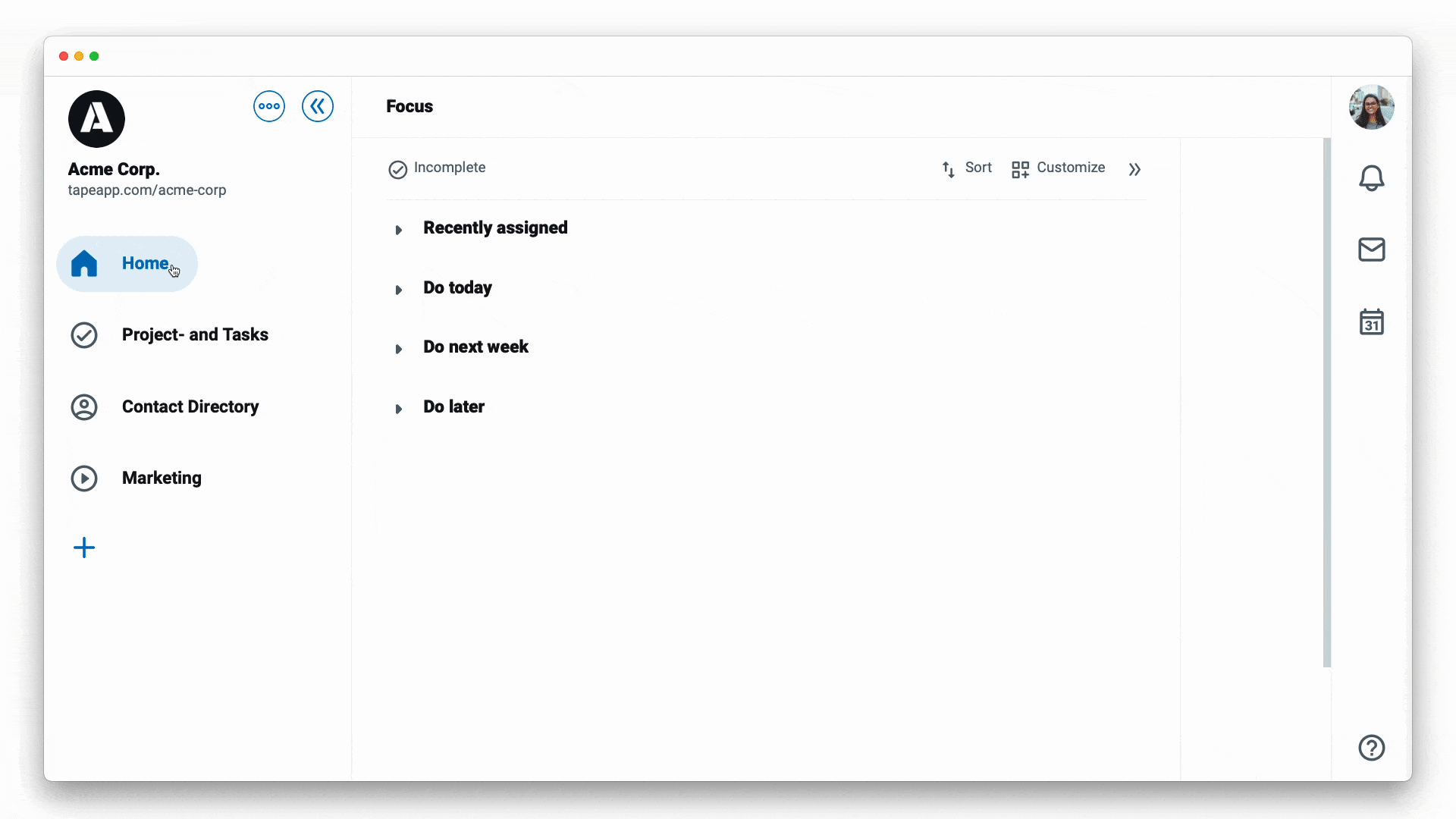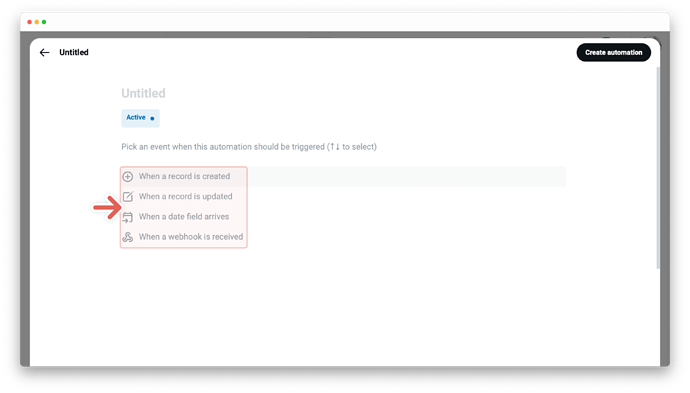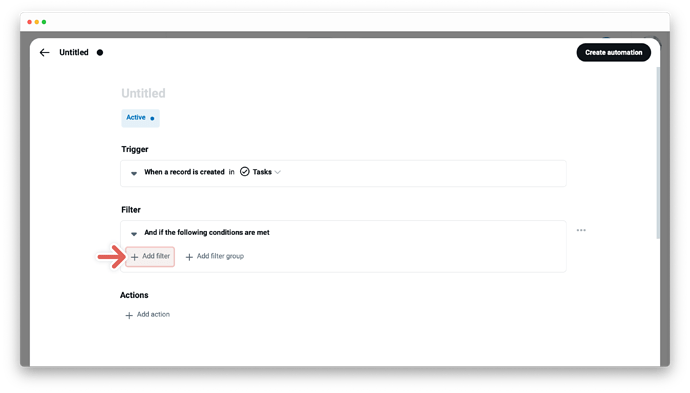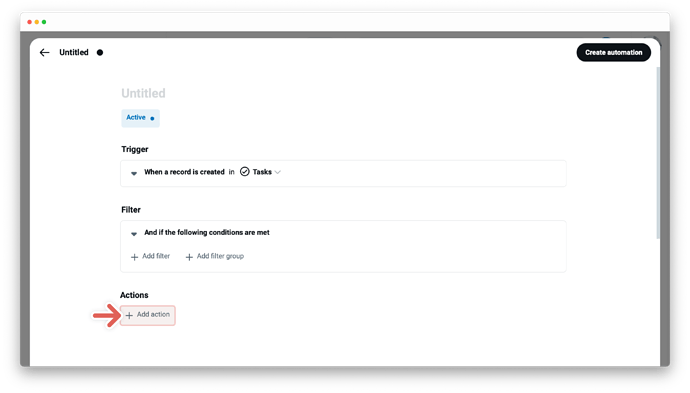An Action is one of the three parts of an automation and it is the third block in the automation editor. Multiple actions can be configured, each with its own block.
To enable any type of automation, you’ll need to set up a trigger and one or more actions. Some automations also use filters.
- A trigger is an event that starts an automation. The “When this happens” statement. For example, “When a status changes” Learn more about →
- Filters are optional and start actions only if certain conditions are met. The “And if conditions are met” statement. For example, "only if the status changes to done" Learn more about →
- An action is an event the automation performs automatically after it is triggered. The “Then do that” statement. For example, “then send an email to a customer”.
![]() Note: The following topic assumes you’re an admin or owner. Otherwise, you won’t see all these options.
Note: The following topic assumes you’re an admin or owner. Otherwise, you won’t see all these options.
Set an action by creating a new automation
-
Go to an app
-
Click on the
...menu next to the app name -
Tap on
Workflow automation -
Click either the
New automationbutton on the top right or click the+ Create new automationcard in the gallery -
Name the brand new automation with a title, that appeared with some options first. In order to further describe your automation, hover over the name and click on
Add description. -
First automation block - Trigger - the “When this happens” automation statement
- Choose a trigger - the event when this automation should be triggered, for example
When a record is created - Set your trigger, for example, “When a record is created” by selecting the app where the automation should be triggered
- Choose a trigger - the event when this automation should be triggered, for example
-
Second automation block - Filter (optional) - the “And if conditions are met” automation statement
- Choose the existing filter or click
+ Add filterto add another filter - Set your filter to start actions only if certain conditions are met:
- A field to be evaluated, at the first dropdown menu
- An operator at the second dropdown menu, i.e., Contains, Does not contain, Is not, etc.
- A field value - enter the field value for the selected field from the first dropdown. Note that the operators e.g. “is empty” and “is not empty” do not require you to input a field value
- Choose the existing filter or click
-
Third automation block - Action - the “Then do that” automation statement
- Click on
+ Add actionand choose between various actions for exampleUpdate record - Click
+ Add field- every field type has its own row. Add as many as you like. - Set up the action condition to create the new record:
- A field to be evaluated, at the first dropdown menu
- An operator at the second dropdown menu depends on the selected field type i.e., Set value, Set options, Set date, etc.
- A field value - enter the field value for the selected field from the first dropdown
- Click on
-
Click on
Create automationat the top right
![]() The automation will run automatically in the background to look for the trigger event and it will run the action steps every time the trigger event occurs.
The automation will run automatically in the background to look for the trigger event and it will run the action steps every time the trigger event occurs.
Edit and manage action
The automation editor allows you to edit or manage actions and holds all the important details about your specific automation. To open the editor - click the card with the title of your automation at the gallery of the automation center. From this point, you can choose between various options.

Action settings
- Hover over the action block and click on the
...at the very right - Choose between the following settings:
- Select an author for the automation -
Automationis selected by default -
Silent- if switched on, notifications will not be sent for this action -
Trigger other automations- if switched on, other automations will be triggered from this action -
Trigger webhook- if switched on, a webhook event will fire from this action -
Turn into- to change to another action Duplicate-
Remove
- Select an author for the automation -
Action setup
Each action, whether basic or advanced, has its own setup that allows you to create the best automation possible. Click on the link for each action in the list below to get specific detail.
As an example the setup for the action “Update record”:
-
Set up the action condition:
- A field to be evaluated, at the first dropdown menu
- An operator at the second dropdown menu depends on the selected field type i.e., Set value, Set options, Set date, etc.
- A field value - enter the field value for the selected field from the first dropdown
-
Click on each action condition´s
...menu to:DuplicateRemove
-
Rearrange action conditions or any action, if there are several in one automation:
- Hover over the drag & drop
⁝⁝icon on the left of every action condition and hold it - Drag and drop
- Hover over the drag & drop
Add multiple actions to the same automation
- You can create more actions and combine the actions at the same automation. These can be nested up multiple layers deep. Here’s how:
- Add multiple actions by clicking
+ Add actionand choose between various actions - Setup each action for itself
- Actions execute one by one
- Add multiple actions by clicking
Keyboard shortcuts
Tape´s automations are fully equipped with keyboard shortcuts, so you can do everything without ever touching the mouse. Check out more →
Save changes
Click the save change button on the top right or use the keyboard shortcut cmd/ctrl + S
Action types and status
 Released
Released
BASIC
-
Create a new record Check out more →
-
Update the current record Check out more →
-
Delete the current record Check out more →
-
Restore the current record Check out more →
-
Add a comment to the current record Check out more →
-
Get previous values Check out more →
-
Create PDF Check out more →
-
Send email Check out more →
-
Display a message on a web page Check out more →
-
Redirect users to another web page Check out more →
ADVANCED
-
Search for records Check out more →
-
Get related records for the current record Check out more →
-
Get related for collected Check out more →
-
Update related records Check out more →
-
Update collected Check out more →
-
Comment on collected Check out more →
-
Sort collected Check out more →
-
Clear collected records Check out more →
-
Call automation Check out more →
-
Create web link Check out more →
-
Call automation on collected Check out more →
-
Execute JavaScript code and save the output in variables for later use Check out more →
-
Perform a calculation in JavaScript, save the result in a variable for later use Check out more →
-
Send a HTTP request and save the response in a variable for later use Check out more →
-
Conditional action • run actions only if the conditions are met Check out more →
-
Loop actions • run actions repeatedly for each earlier collected record or for specific field values Check out more →
-
Delete current record Check out more →
-
Reply to comment Check out more →
-
Delay execution of actions Check out more →
-
End run Check out more →
-
Rollup collected Check out more →
-
Send email to collected Check out more →
-
Filter collected Check out more →
Check out how to create an automation →


